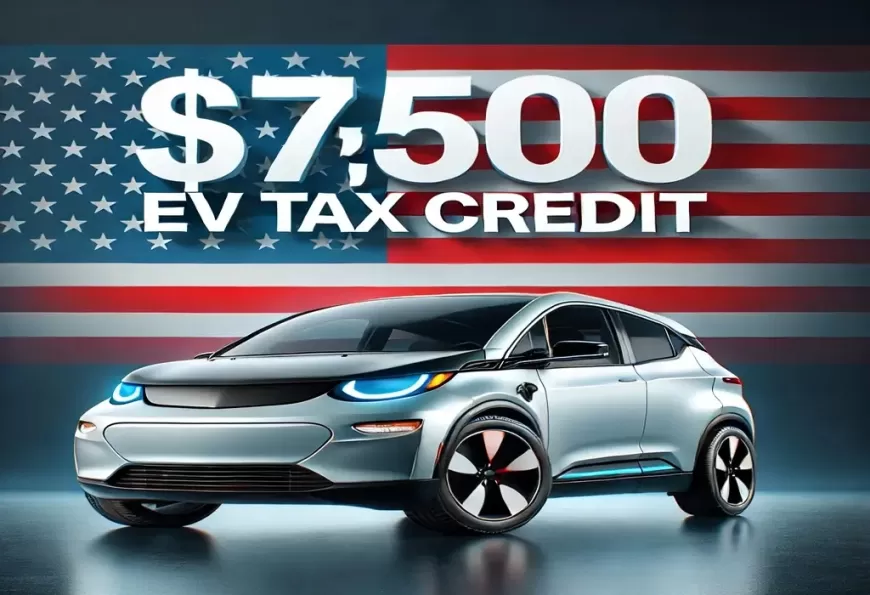Last Chance to Save $7,500! Buy an EV Now Before the Tax Credit Ends!
Save $7,500 on an EV before the tax credit ends! Act now to secure great deals on electric vehicles before changes take effect in 2025.

If you’ve been thinking about buying an electric vehicle (EV), now might be the best time to make your move. With a $7,500 federal tax credit on the line and a shift in political leadership, the window of opportunity could soon close. Here’s everything you need to know about why acting quickly might save you money and help you get the best deal on an EV.
The Threat of Losing the $7,500 Federal Tax Credit
One of the key incentives for purchasing an electric vehicle in the United States has been the $7,500 federal tax credit. However, this benefit could soon be eliminated. President-elect Donald Trump has indicated that he plans to remove the tax credit, possibly as soon as his administration takes office in January 2025. While it’s unclear exactly how he will implement this change, some experts warn that the credit could be eliminated retroactively to the start of the year, leaving only a small window for buyers to take advantage of it.
As the new administration settles in, it’s expected that the tax credit will be one of the first things targeted in upcoming tax legislation. According to Ivan Drury, Director of Insights at Edmunds, it’s likely that the credit will not last long into 2025, so prospective buyers should act quickly.
Why Now is the Perfect Time to Buy an EV
Even without the tax credit, now could still be an ideal time to purchase an EV. The electric vehicle market is currently facing a combination of factors that make buying an EV a smart choice right now:
-
High Inventory Levels: Many dealers are sitting on a large number of unsold electric vehicles, especially older models. This is because of slower-than-expected demand and the introduction of new EV models. In fact, nearly 64% of EVs sitting on dealership lots are from the previous model year, which is much higher than the inventory of traditional gas-powered vehicles.
-
Discounts and Incentives from Automakers: Due to the surplus of older EV models, many automakers are offering attractive financing and lease options to move vehicles off the lot. According to Edmunds, the average lease payment for non-Tesla EVs has dropped by as much as 40% since the start of 2023. In addition, the interest rates on these leases have been reduced by more than half, making EVs more affordable than ever.
-
Double Benefits of Tax Credits and Discounts: If you buy an EV now, you’ll not only benefit from the federal tax credit (while it lasts), but you’ll also take advantage of these dealer incentives, which may disappear if demand picks up. It’s a rare opportunity to get both the tax credit and a significant discount.
The Potential Impact of Losing the Tax Credit
While the tax credit is a significant motivator for many buyers, its potential removal could have a ripple effect on the EV market. Without the $7,500 incentive, demand for electric vehicles might decline, which could lead to automakers scaling back their EV production. This, in turn, could result in fewer choices for consumers and higher prices as competition drops.
Legacy automakers like General Motors, Ford, and Stellantis, who are investing heavily in electric vehicles, could be particularly affected. These companies have yet to see profits from their EVs due to high development costs, and if sales slow down, they may cut back production, leaving Tesla with less competition in the EV market.
EV Market Outlook for 2025 and Beyond
Despite the potential loss of the federal tax credit, experts still expect the EV market to continue growing, albeit at a slower pace. According to Chris Hopson, Principal Automotive Analyst at S&P Global, around 20 new EV models are expected to hit the market in 2025, which will likely attract more buyers. However, if the tax credit is removed early in the year, the industry might adjust its forecast for EV sales, predicting more modest growth.
Automakers could respond to this shift by offering deeper discounts or reducing prices even further to maintain interest in their electric vehicles. Some states, like California, are also looking into offering state-level tax credits to fill the gap left by the federal tax credit, which could help make EVs more accessible to buyers in those regions.
Should You Wait or Buy Now?
If you’ve been on the fence about buying an EV, the next few weeks could be crucial. Acting now means you can take advantage of both the federal tax credit and the current dealer incentives, potentially saving thousands of dollars. However, if the tax credit disappears and demand for EVs declines, you may face higher prices or fewer options down the line.
Ultimately, the decision to buy now or wait depends on your individual circumstances and whether you’re looking for the best deal possible. If you're ready to make the switch to an electric vehicle, moving quickly could be a smart move.
Key Takeaways:
-
The $7,500 federal tax credit for EVs may be eliminated in early 2025.
-
Current market conditions, including high inventory and manufacturer incentives, make now a great time to buy.
-
Automakers may adjust prices if the tax credit disappears, but state-level incentives could help offset the loss.
-
The EV market is still expected to grow, but at a slower pace, with more models arriving in 2025.
By considering these factors, you can make an informed decision on whether to buy an EV now or wait for future developments.






























































